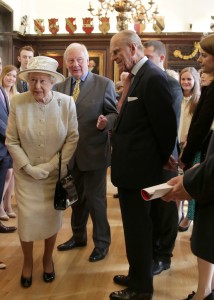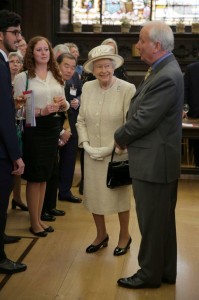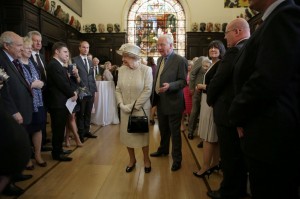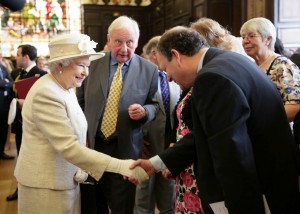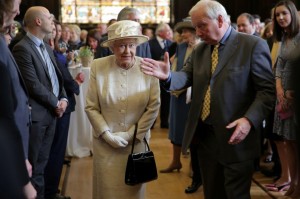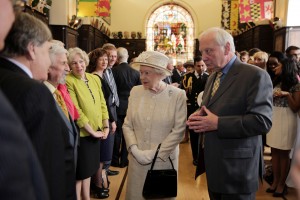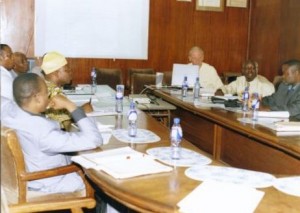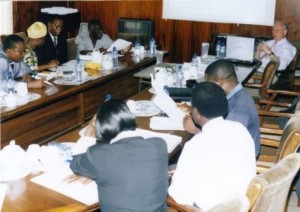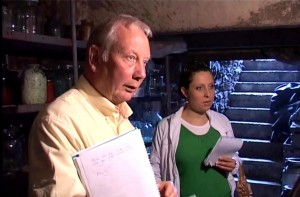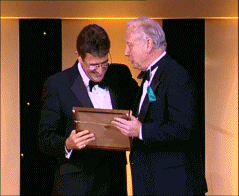A tribute to Charles Dickens’ invaluable contribution in helping to establish the Newspaper Press Fund was one of the highlights of a thanksgiving service at Bride’s Church, Fleet Street, when media executives, editors, reporters and their guests gathered to celebrate the 150th anniversary of the Journalists’ Charity.
Dickens, a former Parliamentary reporter, was one of the Fund’s earliest supporters and the author’s love of journalism was captured by the actor Simon Callow.
For the fifth reading at the service, Callow took an extract from Dickens’ address to the NPF’s second annual festival in May 1865. Dickens was in the chair at the festival dinner, held in the Freemasons’ Tavern in Queen Street, just off Fleet Street.
He was “a journalist to his fingertips all his life” and his speech proposing the toast recalled his early days as a parliamentary reporter starting at the age of eighteen. Dickens often “transcribed to the printer direct from my shorthand note” and had written “on the palm of my hand” under the dark light of a lamp while riding in a coach.
Dickens coupled his toast in 1865 with an expression of his “undying interest” in his old pursuit and promised his continued support for the NPF, “a sound, wholesome institution.”
The thanksgiving service was a key event at the start of the charity’s 150th anniversary year and the chairman of the trustees, Laurie Upshon, thanked St Bride’s and Nokia, the sponsors of the service, for helping to organise such an appropriate service in “the Cathedral of Fleet Street, the Street of Dreams”.
Alex Crawford, the award winning television journalist who works for Sky News, gave the address. She was awarded the OBE in 2012 for her services to broadcast journalism after her widely-praised reporting of the Libyan civil war the year before.
Ms Crawford paid tribute to Adam McKinlay, editor of the Wokingham Times, who hired her at the age of eighteen and whom she later negotiated with as mother of the chapel. She asked the congregation to remember those journalists who had lost their lives in recent conflicts in what after all could be a dangerous profession.
“As a journalist it was probably very early on, working on a student newspaper or a local radio station, that you realised journalism has a loud voice and you realised you can make a difference.
“Postings on social media and Twitter can never replace serious, questioning journalism in the field. The public knows the difference. More than ever before, journalists are being targeted and attacked simply because we make a difference. So let us remember this extended family who are doing this incredible job.”
The four readings which preceded Simon Callow’s extract from Dickens’ speech were also from the works of celebrated journalists of the past – and they were delivered by some equally powerful figures from the media world of today.
Simon Fox, chief executive of Trinity Mirror, began the readings with an extract from Streets Ahead by Keith Waterhouse recounting his experiences on arriving in Fleet Street. Waterhouse recalled how he felt having secured his first job in the “street of ink, the street of adventure; I was over the frontier.”
Paul Dacre, editor-in-chief of the Daily Mail, read from the writings of Vincent Mulchrone, “Britain’s greatest popular journalist”, whose work had stood the test of time as “a poignant reminder of those pre-digital days when Fleet Street was the capital of journalism.
David Dinsmore, editor of The Sun, read from the Greatest Company in the World by William Connor (Cassandra). There were plenty of chuckles as Dinsmore read out some of Connor’s pithy descriptions of journalism, being like “high diving minus the water”.
Fleet Street was like snakes and ladders with a greasy pole, “a slippery slide with a banana skin that everyone can see; I know, I have done it.”
Murdoch MacLennan, chief executive of the Telegraph Media Group, read from W.F. Deedes’ reflections on his life as a journalist. Bill Deedes was a journalist’s journalist who had been a reporter for seventy five years, which was “exactly half the life of the Journalists’ Charity.”
Mr MacLennan read from an article which Deedes wrote for the Daily Telegraph on the 70th anniversary of his first day in Fleet Street and the bliss of getting a job in 1931 when there were 2.75million unemployed.
In welcoming the charity’s supporters and friends Laurie Upshon paid a special mention to Gail Ellisdon, the great, great granddaughter of Walter Ellisdon, who was one of the charity’s founders.
As Mr Upshon explained, many a good idea has been hatched up by journalists in a pub and that was certainly the case with the group of parliamentary reporters who met in 1864 to set up a fund to assist fellow journalists who had fallen on desperate times.
“The work they began has continued, without interruption, for 150 years. The charity has, of course, evolved. We now support journalists working across all media. We run retirement, care and extra-care homes. Perhaps more important, we now give away around £400,000 each year to help those in difficulty. The demands on the charity are greater than ever.”
In his welcome, the Venerable David Meara, who conducted the service, said their celebration of this milestone in the life of the renamed Journalists’ Charity and an opportunity to give thanks for all its work in providing vital help, support and residential care for all who worked in the profession. Over 2,000 journalists in need had been assisted over the past ten years.
“We celebrate too the profession of journalism and the vital importance of a free press as one of the pillars of a democratic society. We salute those who chronicle the rich pageant of human life in this country and across the world.”
LINK TO:http://www.journalistscharity.org.uk/st-brides-thanksgiving-service-milestone-life-journalists-charity/
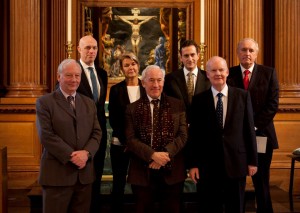
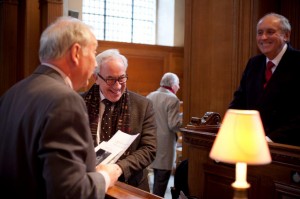
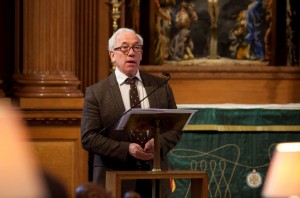
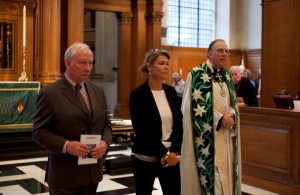
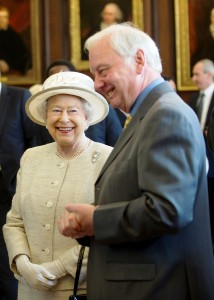 The Queen celebrated 150 years of the Journalists’ Charity at a reception in Stationers’ Hall, London, on 7th May.
The Queen celebrated 150 years of the Journalists’ Charity at a reception in Stationers’ Hall, London, on 7th May.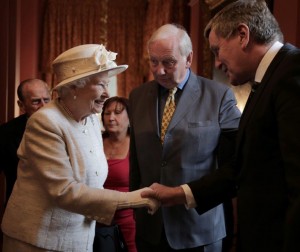
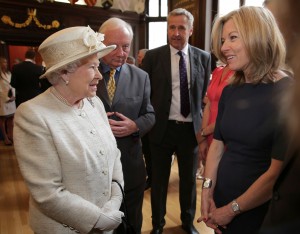
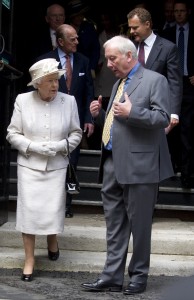 Upshon said modern developments interested the Queen: “She was intrigued by the changes to the industry, the way there’s online work now and the changes it has brought to the print industry. She was intrigued young journalists are still taught shorthand.”
Upshon said modern developments interested the Queen: “She was intrigued by the changes to the industry, the way there’s online work now and the changes it has brought to the print industry. She was intrigued young journalists are still taught shorthand.”